Brown Collection: 37. The Gypsy Laddie [See music at bottom of page]
[This ballad was in the repertoire of I.G. Greer and appears several times in the Greer/Abrams Collections. It's unclear the exact number of versions Greer knew. There are several Greer transcriptions under Sheet Music 01-05.
Not counting sheet music these texts and recordings are available:
Gypsy Davy, performed by Mrs. Ephraim Stanley
Recorded on October 3, 1940, Miss Cook performs "Black Jack Davy." Abrams Collection
Black Jack Davy, performed by Mrs. James York
Black Jack Davy, performed by Mrs. Dora V. Mast
Black Jack Davy, performed by Pearl Webb
Black Jack Davy, performed by Frank Proffitt with an introduction by Dr. Abrams
Black Jack Davey 3
Gypsy Laddie Lyric 01 [not exact to any other version; very similar to B (Greer)]
Gypsy Laddie Lyric 02 (Greer E stanzas 1-10 and 12)
Gypsy Laddie Lyric 03 (Greer - Brown E written on one page, some handwritten stanzas at bottom)
Black Jack David (Lyric 04) Greer (Brown E)
Gypsy Laddie Lyric 05 (similar to 01 but has ending verses of Greer, Brown E)
Also found is the MS of Brown B from Thomas Smith. Several of MS and recordings are found in the Brown Collection but others-- like Nora Hicks' recording-- are missing. Unfortunately, none of the MS texts have sources or informants listed.
R. Matteson 2015]
37. The Gypsy Laddie (Child 200)
Still widely known and sung; see BSM 73-4, and add to the citations there given Massachusetts (FSONE 207-9), Tennessee (SFLQ XI 130-1), North Carolina (FSRA 2)7, one stanza only), Florida (SFLQ viii 156), Arkansas (OFS I 152-3, 155-60), Missouri (OFS I 155-9), Ohio (BSO 67-9), Indiana (BSI 134), and Kittredge's bibliographical note JAFL xxx 323. Texts from the Southern states are likely to include, rather incongruously, stanzas from the wooing song 'Where are you Going, my Pretty Maid?' So in Tennessee (FSSH iii), Mississippi (FSM 118-19), and North Carolina (SCSM 218 and versions A B D E G below).
A. 'Black Jack David.' From the Isabel Rawn collection, sent to Dr. Brown for the North Carolina society in 1915. Some of her findings, and perhaps this, were made in Cherokee county, in the southwest corner of the state. The last line of each stanza is repeated.
I Black Jack David come a-running through the woods,
A-singing oh so merrily,
He made green hills ail around him ring
And charmed the heart of a lady,
And charmed the heart of a lady.
2 'Come go with me, my pretty little miss,
Come go with me, my honey;
I'll take you to the deep, deep sea.
And you never shall want for money.
3 'How old are you, my pretty little miss?
How old are you, my honey?'
She answered him with a tee-hee-ha,
'I'll be sixteen next Sunday.'
4 'Go saddle me up my old gray horse,
Go saddle me up my darby,
And I'll ride east, and I'll ride west.
Till I overtake my honey.'
5 He rode and rode till he came to the sea,
The sea so dark and lonely;
The tears came twinkling down his cheeks,
For here was a body's [1] honey.
6 'Oh say will you leave your house and home.
And say will you leave your money.
Oh say will you leave your husband and babe
And go with the Black Jack David?'
7 'Yes I will leave my house and home.
Yes I will leave my money,
Yes I will leave my husband and babe
And go with my Black Jack David.
8 'Last night I lay on a fine feather bed
Beside of my husband and baby.
But tonight I'll lay on the cold, cold ground
Beside of my Black Jack David.'
Footnote 1. So the manuscript. Does it mean "somebody's"? Or "nobody's"? In neither case; it altogether intelligible.
B. 'Black Jack David.' Sent by Thomas Smith of Zionville, Watauga county, in 1914 to C. Alphonso Smith and later passed on to Dr. Brown. "Written as sung by a neighbor, Mrs. Julia Grogan of Zionville, who learned the ballad from her father." Somewhat nearer than A to the normal form. Here as in A the last line of each stanza is repeated.
I Black Jack David came riding through the woods,
Singing so loud and merry
He made the green woods all around him ring,
And charmed the heart of a lady,
And charmed the heart of a lady.
2 'How old are you, my sweet little miss?
How old are you, my honey?'
She answered him with a 'tee hee hee!
I will be sixteen a Sunday.'
3 'Come go with me, my pretty little miss,
Come go with me, my honey;
I'll take you across the deep blue sea
Where you never shall want for money.'
4 She pulled off her high-heeled shoes
All made of Spanish leather,
Put on a pair of low-heeled shoes
And they both rode off together.
5 Late that night when the landlord came home
Inquiring for his lady
He was informed by a fair young maid
She had gone with the Black Jack David.
6 'Go saddle for me my milk-white steed,
Go bridle for me my Darby;
I'll ride to the East, I'll ride to the West
Till I overtake my lady.'
7 He rode till he came to the deep blue sea ;
The sea was dark and muddy.
Tears came trickling down his cheeks.
For there he saw his lady.
8 'Will you forsake your house and land?
Will you forsake your baby?
Will you forsake your husband dear
And go with the Black Jack David?'
9 'I will forsake my house and land,
I will forsake my baby,
I will forsake my husband dear
And go with the Black Jack David.
10 'Last night I slept on a fine feather bed
Beside my husband and baby;
Tonight I'll sleep on the damp cold ground
In the arms of the Black Jack David.
In the arms of the Black Jack David.'
C. 'The Egyptian Davy O.' Another — and much abbreviated — text sent by Thomas Smith of Zionville in 1914 to C. Alphonso Smith and later to the North Carolina collection. The rhymes and in a less degree the refrain are suggestive of the familiar "raggle-taggle gypsies" form of the ballad.
1 There were three Egyptians living in the East,
They were three Egyptians lairio;
They sung the Egyptian songs
Till they charmed the heart of a lady o.
Rol de ma rinktom rinktom
Rol de ma rinktom rario.
2 'Go saddle me my milk-white steed,
Go saddle me my hasty O;
I'll ride all day and I'll ride all night
Till I overtake my honey O.'
3 I rode east and I rode west
Till I came to some distant lairio,
And there I found my pretty little miss
Sitting on the knee of the Egyptian Da[v]y o.
4 'Come go back with me, my pretty little miss,
Come go back with me, my honey o.
I'll take and lock you in a higher room
Where the Egyptians can't get a-nigh you.'
D. 'Black-Eyed Davy.' A third text supplied by Thomas Smith. "Sung March 11, 1915, by Mrs. Peggy Perry, Silverstone, Watauga county. The lady is past 75 years of age and heard the song sung by her grandfather 'Clem Dosset,' who was a soldier in the American Revolution. Mrs. Perry . . . has sung this song, she says, to her children and grandchildren for many years."
1 'How old are you, my pretty Polly?
How old are you, my honey?'
She answered him most modestly,
'I'm between sixteen and twenty.'
Chorus: Ti diddle a tiddle um Davy
Ti diddle a tiddle um Davy
Ti diddle a tiddle um Davy
2 He came home very late in the night
Inquiring for his lady.
The news came sweet from every side :
'She's gone with the black-eyed Davy.'
3 He caught his black and he caught his gray,
And his black was very speedy.
He rode all night and he rode all day
And he couldn't overtake his lady.
4 He rode to the riverside;
The river was deep and muddy.
He rode on to the other side
And there he found his honey.
5 'Will you leave your house and land?
Will you leave your baby?
Will you leave your own true love
And follow the black-eyed Davy?'
6 'I will leave my house and land,
I will leave my baby,
I will leave my own true love
And follow the black-eyed Davy.'
Later Mrs. Perry supplied the following "missing verses." The first of them should perhaps be the second stanza; the second is clearly final,
'Where are you going, my pretty Polly?
Where are you going, my honey?'
She answered him quite modestly,
'I'm going with the black-eyed Davy.'
'If ever I do marry again,
I'll marry for love or riches.
She must wear the petticoat.
And I will wear the britches.'
E. 'Black Jack David.' Contributed by I. G. Greer of Boone, Watauga county, apparently in 1915. An unusually full version. The last line of each stanza is repeated. [Black Jack David; Lyric Variant 04]
1 Black Jack David come ridin' through the woods,
Singin' so loud and merry
That the green hills all around him ring.
And he charmed the heart of a lady.
And he charmed the heart of a lady.
2 'How old are you, my pretty little miss.
How old are you, my lady?'
She answered him with a 'tee, hee, hee,
I'll be sixteen next summer,'
3. 'Come, go with me, my pretty little miss.
Come, go with me, my lady;
I'll take you across the deep blue sea
Where you never shall want for money.
4 'Won't you pull off those high heel shoes
All made of Spanish leather;
Won't you put on some low heel shoes?
And we'll ride off together.'
5 She soon pulled off those high heeled shoes
All made of Spanish leather;
She put on those low heeled shoes
And they rode off together.
6 'Twas late at night when the land-lord come
Inquirin' for his lady.
He was posted by a fair young maid:
'She's gone with Black Jack David.'
7 Go saddle me my noble steed,
Go bridle me my derby;
I'll ride to the east, I'll ride to the west.
Or overtake my lady.'
8 He rode till he came to the deep below ;
The stream was deep and muddy.
Tears came tricklin' down his cheeks.
For there he spied his lady.
9 'How can you leave your house and land,
How can you leave your baby,
How can you leave your husband dear
To go with Black Jack David?'
10 'Very well can I leave my house and land,
Very well can I leave my baby.
Much better can I leave my husband dear
To go with Black Jack David.
11 'I won't come back to you, my love,
Nor I won't come back, my husband;
I wouldn't give a kiss from David's lips
For all your land and money.
12 'Last night I lay on a feather bed
Beside my husband and baby ;
Tonight I lay on the cold damp ground
Beside the Black Jack David.'
13 She soon run through her gay clothing.
Her velvet shoes and stockings;
Her gold ring off her finger was gone,
And the gold plate off her bosom.
14 'Oh, once I had a house and land,
A feather bed and money,
But now I've come to an old straw pad.
With nothing but Black Jack David.'
F. 'The Gypsy Davy.' Secured by Mrs. Sutton from the singing of Mrs. J. J. Miller (the 'Myra' from whom Mrs. Sutton got so many of her songs) at King's Creek, Caldwell county. "She learned it from her aunt, Mrs. John Barrett, in the Brushy Mountains." Nine stanzas. The earlier part of the story is missing in this version; it begins with the husband coming home to find his lady gone. The last three stanzas vary somewhat from the customary form; they are a dialogue between
the husband and the wife:
7 'Last night I lay on a warm feather bed.
My arms were around my baby;
Tonight I shall lie on some cold river bank
In the arms of a Gypsy Davie.'
8 'Pull off, pull off those fine kid gloves,
They're made of Spanish leather,
And give to me your lily-white hand
And we'll shake hands together.'
9 'I can pull off those fine kid gloves,
They're made of Spanish leather,
And give to you my lily-white hand —
Bid you farewell forever.'
G. 'How Old are You, my Pretty Little Miss?' Contributed by James York of Iredell county in August 1939. Exceptional in that it is throughout in the first person; sometimes unannounced dialogue, sometimes first person narrative.
1 'How old are you, my pretty little miss?
How old are you, my honey?'
'I'll answer you in the modest way :
I'll be sixteen next Sunday
Rataling a do a do a do
Rataling a do a do a do
2 'Will you marry me, my pretty little miss?
Will you marry me, my honey?'
T'll answer you in the modest way :
If it wasn't for my dinged old mammy.'
3 'Go saddle up the iron gray horse,
For the black is not so speedy.
I'll ride all day and I'll ride all night
Till I overtake my lady.'
4 I rode on down to the old man's house
Inquiring of my lady.
The only reply he made to me,
'She's followed the Gyps of Davy.'
5 I rode on down the wide water side,
Where it was deep and muddy.
The tears came trinkling down my cheeks,
For there I beheld my lady.
6 'Will you forsake your house and lands,
Will you forsake your baby.
Will you forsake your old Will and all
And follow the Gyps of Davy?'
7 'Yes, I'll forsake my house and lands.
And I'll forsake my baby,
And I'll forsake my old Will and all
And follow the Gyps of Davy.'
------------------------------------
37. The Gypsy Laddie (Child 200) [Music from Vol. 4]
A. 'Black Jack David.' Sung by Mrs. Nora Hicks. Recorded at Mast's Gap Watauga county, September 1940. Measures 1-2 and 5-6 are closely related to those in 37B, 37B(i), and 37I. These have astonishingly much in common with the melody 'Der mey hat menig Herze hoch ersteiget,' which was composed by Neithart von Reuenthal (1180-1240). Cf. DTOe, vol. 2)7, I-
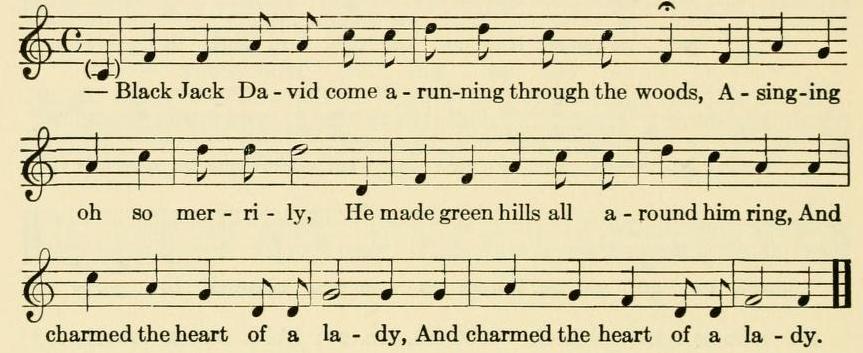
For melodic relationship cf. **SharpK I 144, No. 20N, measures 1-2, and 31G, 31H, measures 1-2 with our 1-2 and 5-6, melodic outline only; BMFSB 6. Scale: Mode III, plagal. Tonal Center: f. Structure: aba1 cc1 (2,2,2,2,2) = ab (4,6). The b is related to a; the second phrase is internally incremented.
B. 'Black Jack David.' Sung by Mrs. Julia Grogan. Recorded at Zionville, Watauga county; no date given. "Written as sung by a neighbor" (II 162) evidently pertains to the text, since we have a recording. Measures 1-2 and 5-6 correspond very closely to those of 37A. There were two more recordings, one of the Michael version, the other anonymous, both of which differ from
this version to a lesser or greater degree. The differences are given below in the variations.

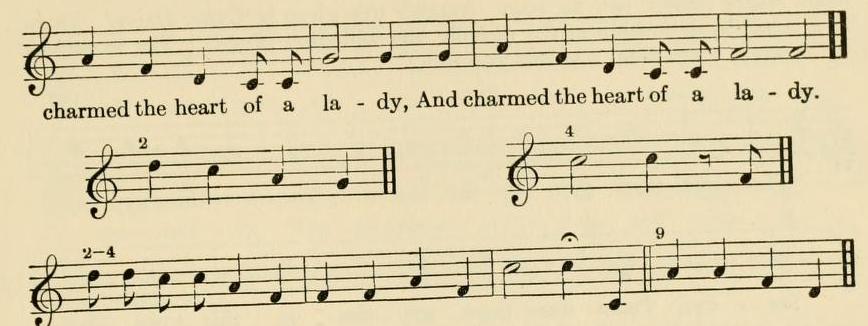
For melodic relationship cf. ***TBV 590-1. No. 37A. last two measures, stanza as well as refrain; **BMFSB 6. Scale: Mode III. plagal. Tonal Center: f, Structure: aba1cc1 (2.a....,a) = ab (4,6). The second phrase is termmally mcremented.
B(1) Black Jack David.' Sung by Mrs. J. Church. Recorded at Heaton, Avery county, August 10, 1939. Mr. Brown notes, "The Churches live at the foot of Oak Ridge, near Pogy Mountain." The first six measures of thsi melody are nearly identical to 37B.
%20.jpg)
For melodic relationship cf. ***SharpK i 228-9. No. 31G and H (the melodic line of measures 1-2 and 5-6 only). Scale: Mode III, plagal. Tonal Center : f. Structure: aba1cd (2,2.2.2.2) = ab (4,6) ; the second phrase is internally mcremented.
C. 'The Egyptian Davy O.' Sung by Mrs. Ephraim Stamey. Recorded at Altamont, Avery county, July 14, 1940. Another title given is 'Gypsy Daisy.' There is a general relationship in the melodic line with that of 37G. The variations for measure 1 are from a second recording.
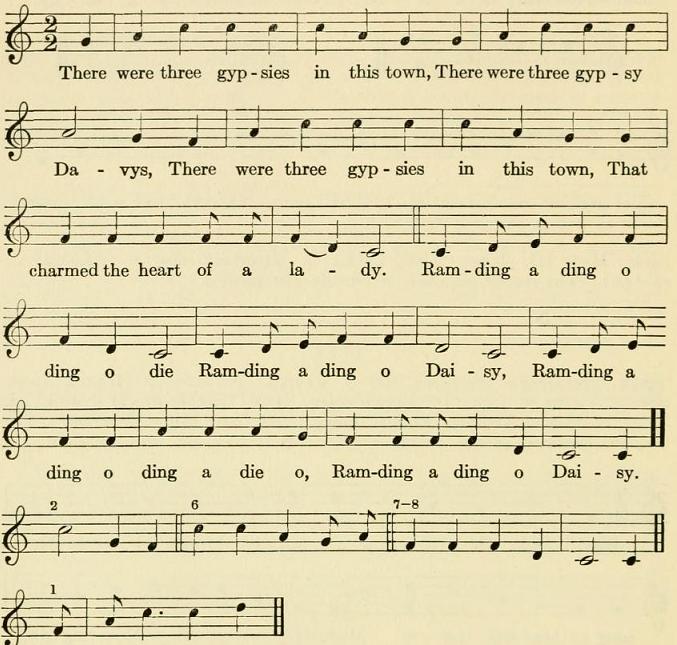
For melodic relationship cf. *SharpK i 235, No. 33D, measures 1-3; BB 95, version D. Scale: Hexatonic (4), plagal. Tonal Center: f. Structure: (stanza) aa1a1b (2,2,2,2); (refrain) cc1c1b1 (2,2,2,2); (both together) aa1bb1 (4,4,4,4). Circular Tune (V).
D. 'Black-Eyed Davy.' Sung by Mrs. Peggy Perry. Recorded at Silverstone, Watauga county, March 11, 1915. The beginning on the seventh degree is most unusual.


For melodic relationship cf. *SharpK i 236, No. 33E, measure 1, otherwise only rhythmically. Scale: Heptachordal. Tonal Center: c. Structure: abb1c (2,2,2,2) = ab (4,4).
D(1) 'Black-Eyed Davy.' Sung by Mrs. N. T. Byers. No date or place given. This and the following two versions by Dr. I. G. Greer, all of which are basically the same melody, serve as fine examples of the intuitive and spontaneous artistry of
the folksinger in varying tonal material to suit the occasion.
.jpg)
For melodic relationship cf. *SharpK i 239, No. 33J, measures 1-2. Scale: Hexachordal, plagal. Tonal Center: f. Structure: abacc1 (2,2,2,2,2)= ab (4,6); the second phrase is internally incremented.
E. 'Black Jack David'. Sung by Dr. I. G. Greer. Recorded at Boone in 1915. Sung again for the present editor at the singer's home in Chapel Hill, 1952. Cf. note to the preceding version, 37D(i). Measures 5-7 remind one slightly of 'Oh, Susanna !'

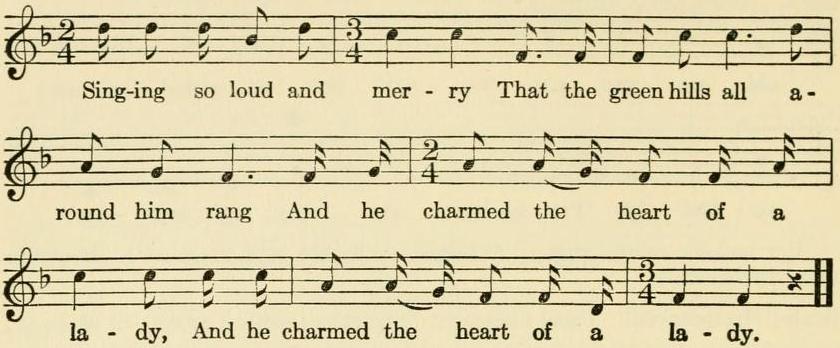
Scale: Hexachordal, plagal. Tonal Center: f. Structure: abab1c1 (2,2,2,2,2) = ab (4,6) ; the second phrase is internally incremented.
E(1) 'Black Jack David.' Sung by Dr. I. G. Greer. No date or place given. This second version, like the first, was again sung for the present editor at the singer's home in Chapel Hill in 1952. Cf. note to 37D(1).
%20f.jpg)
Scale: Hexachordal, plagal. Tonal Center: f. Structure: abacc1 (2,2,2,2,2)= ab (4,6) ; the second phrase is internally incremented.
F. 'The Gypsy Davy.' Sung by Mrs. J. J. Miller. Recorded at King's Creek, Caldwell county; no date. This stanza is the fifth of version B, in II, 162-3.


Scale: Hexachordal. Tonal Center: d. Structure abb1a1 (2,2,2,2).
G. 'How Old Are You, My Pretty Little Miss?' Sung by Mrs. James York. Recorded in Iredell county in August i939- There is a general melodic resemblance with 37C. Measures 7-8 are identical with those of 'What Shall We Do with a Drunken Sailor?' as sung by T. F. Leary in this collection; cf. V.
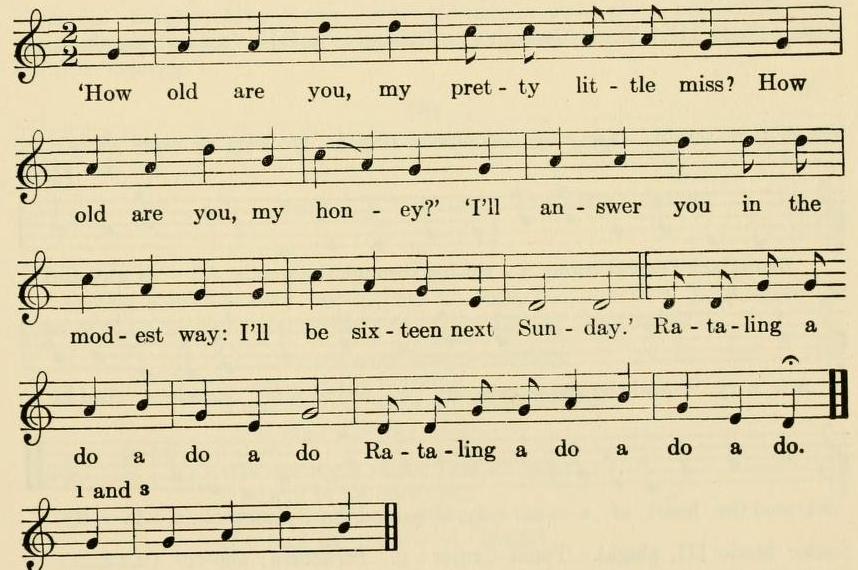
For melodic relationship cf. **SharpK i 234, No. 33B, measures 1-8 for basic melodic tendency only. Scale : Hexachordal, plagal. Tonal Center: g. Structure: aa1a2bcc1 (2,2,2,2,2,2) = abc (4,4,4). Circular Tune (V).
G(1) 'Gypsy Laddie.' Sung by Mrs. Nancy Prather. Recorded at Milam, Ashe county, August 5, 1939. Another title given is 'Gypsy Davy.' The steady use of the one-measure pattern throughout is noteworthy.
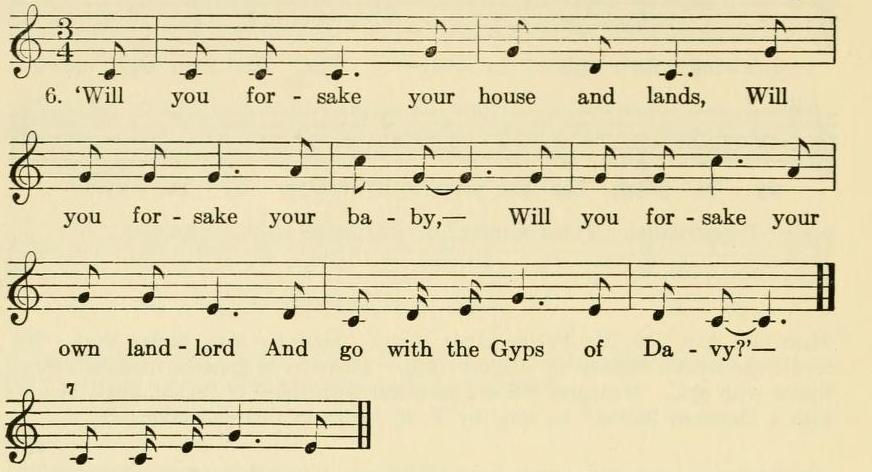
Scale: Mode III. Tonal Center: c. Structure: aa1bb1 (2,2,2,2) = ab (4,4).
H. 'Black Jack David.' Sung by anonymous singer. No date or place given.
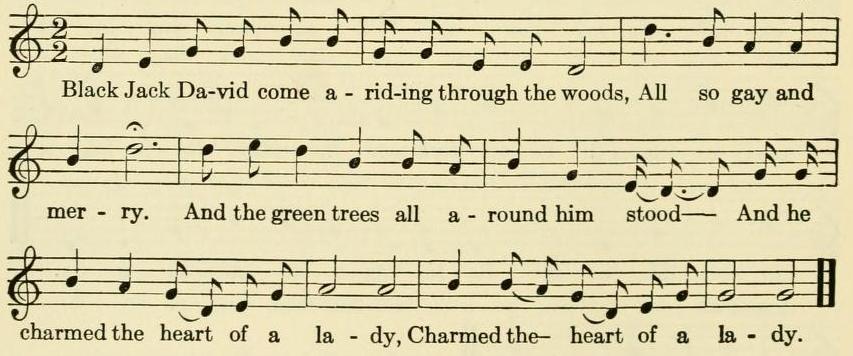
Scale: Mode III, plagal. Tonal Center: g. Structure: abbkci (2,2,2,2,2) = ab (4,6) ; the second phrase is internally incremented.
I. Black Jack David.' Sung by Frank Proffitt. Recorded at Sugar Grove, Watauga county, July 24, 1939. See note to 30A.


Scale: Mode III, plagal. Tonal Center: f. Structure: abaicci (2,2,2,2,2) = ab (4,6) ; the second phrase is internally incremented.